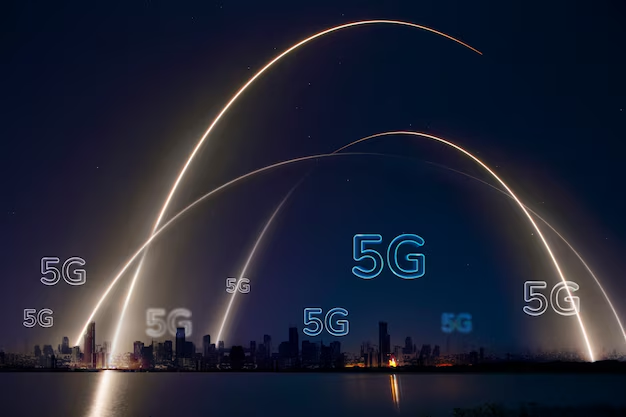The world is on the brink of a major technological revolution, and at the center of it lies 5G technology. As the fifth generation of wireless technology, 5G promises to radically transform how we connect, communicate, and experience the digital world. Unlike its predecessors, 5G is not just about faster internet speeds; it is about creating an entirely new infrastructure that will impact industries, economies, and consumers in profound ways. From transforming industries like healthcare and manufacturing to providing consumers with seamless digital experiences, 5G technology is set to be a game changer.
What is 5G Technology?
5G, or fifth-generation technology, is the latest advancement in mobile network technology. It offers faster data speeds, lower latency, and increased connectivity compared to previous generations, like 4G. However, its real strength lies in its ability to support a vast range of connected devices with extremely fast and reliable network connections. 5G is designed to handle much higher volumes of data and is expected to support the rise of the Internet of Things (IoT), smart cities, autonomous vehicles, and more.
How 5G Will Revolutionize Industries
- Healthcare: Remote Surgery and Real-Time Diagnostics The healthcare industry stands to benefit enormously from 5G technology. With its ultra-low latency and high bandwidth, 5G will enable remote surgeries, real-time diagnostics, and better patient monitoring. Surgeons can use 5G to perform highly precise operations from miles away, using real-time video streaming and robotic systems. Additionally, 5G’s ability to handle vast amounts of medical data means that patients can receive quicker diagnoses and more accurate treatment plans, reducing wait times and improving overall healthcare efficiency.
- Manufacturing: The Rise of Smart Factories In the manufacturing sector, 5G will pave the way for smart factories, where machines, sensors, and robots are all connected via a high-speed, low-latency network. This connectivity will lead to more efficient production processes, real-time monitoring of equipment, and faster response times to maintenance needs. With 5G, manufacturers can collect and analyze data from their machines in real time, leading to improved decision-making, predictive maintenance, and reduced downtime. This connectivity will also enable the widespread use of augmented reality (AR) for training and maintenance, further improving efficiency.
- Transportation: Autonomous Vehicles and Smart Cities One of the most exciting prospects of 5G is its potential to enable autonomous vehicles (AVs). These vehicles require near-instantaneous communication with each other and the surrounding infrastructure to navigate safely. With 5G, vehicles can exchange data about road conditions, traffic patterns, and other essential information in real time. Additionally, smart cities powered by 5G will use connected sensors to monitor everything from traffic flow to energy usage, improving urban efficiency, reducing congestion, and lowering carbon emissions.
- Entertainment: Augmented Reality (AR) and Virtual Reality (VR) The entertainment industry is already experiencing a shift with AR and VR technologies, and 5G is set to take this to the next level. With its high-speed internet and low latency, 5G can deliver immersive experiences in real-time, allowing for high-quality VR and AR content to be streamed seamlessly. Whether it’s gaming, live sports events, or virtual concerts, consumers will be able to access more interactive and engaging content than ever before, all from the comfort of their own homes.
- Retail: Enhanced Shopping Experience Retailers are also looking to take advantage of 5G’s capabilities. For instance, AR-powered virtual try-ons will allow customers to “try” clothes, accessories, or makeup virtually before making a purchase. 5G’s low latency and high speed will make these experiences more seamless and realistic. Furthermore, with 5G, retailers can collect and analyze customer data in real-time, offering personalized shopping experiences and improving inventory management.
Benefits for Consumers
For consumers, 5G offers an array of exciting possibilities, from faster download speeds to more reliable connections. Here are some key benefits that 5G will provide:
- Faster Speeds: With 5G, consumers can expect download speeds of up to 100 times faster than 4G, making tasks like streaming high-definition videos, downloading large files, and playing online games smoother and quicker.
- Low Latency: 5G’s ultra-low latency means nearly instantaneous communication between devices. This will improve everything from video calls to gaming, making them more responsive and enjoyable.
- Enhanced Connectivity: As more devices become connected through the Internet of Things (IoT), 5G will ensure that these devices communicate with one another without interruption. This will lead to smarter homes, where everything from thermostats to refrigerators can be controlled remotely and work in harmony.
- Better Coverage: Unlike 4G, which can struggle to maintain a reliable connection in crowded areas, 5G promises more consistent and reliable coverage, even in densely populated spaces such as stadiums, airports, and city centers.
7 FAQs About 5G Technology
- What is the difference between 4G and 5G?
- 5G offers faster download speeds, lower latency, and the ability to connect more devices simultaneously than 4G, making it ideal for applications like remote surgery, autonomous vehicles, and IoT.
- Will 5G replace 4G?
- No, 5G will complement 4G, not replace it. 4G will still be used in areas where 5G infrastructure is not yet available.
- How fast is 5G?
- 5G can deliver speeds up to 100 times faster than 4G, with potential download speeds of up to 10 Gbps.
- Is 5G safe?
- Yes, 5G is considered safe. Extensive research has been conducted, and regulatory bodies such as the World Health Organization (WHO) and the Federal Communications Commission (FCC) have deemed 5G safe for human exposure.
- When will 5G be available?
- 5G is already available in many major cities around the world. However, full global coverage is expected to take several years, with major deployments continuing through 2025 and beyond.
- What industries will benefit the most from 5G?
- Key industries benefiting from 5G include healthcare, manufacturing, transportation, entertainment, and retail, with applications ranging from remote surgeries to autonomous vehicles and smart cities.
- How will 5G impact everyday consumers?
- Consumers will experience faster internet speeds, more reliable connections, and enhanced experiences in areas such as gaming, streaming, and smart home technology.
Conclusion
5G technology is undoubtedly a game changer. It’s not just about faster internet speeds; it’s about enabling new innovations, transforming industries, and offering consumers a more connected, efficient, and exciting digital experience. Whether you’re in healthcare, retail, entertainment, or simply enjoying faster internet on your smartphone, 5G is poised to revolutionize how we live and work. However, as with any new technology, it will take time for global coverage and full implementation, but the potential for innovation is limitless.
Key Takeaways
- 5G offers faster speeds, lower latency, and greater connectivity, making it ideal for industries like healthcare, manufacturing, and transportation.
- Consumers will benefit from faster downloads, enhanced streaming experiences, and improved connectivity with IoT devices.
- 5G will enable innovative applications such as autonomous vehicles, smart cities, and virtual reality experiences.
- Full global 5G coverage will take time, but major cities are already experiencing its benefits.

